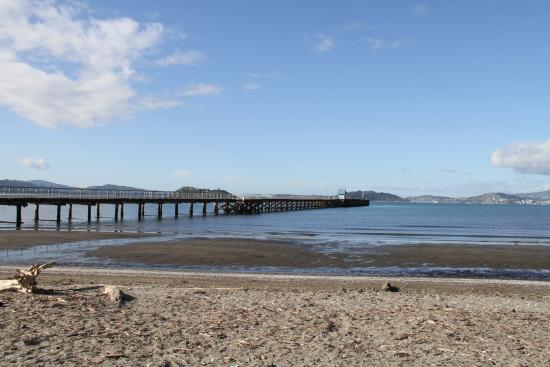Last week I was chatting with a real estate agent who has a superb property for sale on Petone foreshore. With a busy road between the house and the beach, it has fabulous sea views, and is in a prime location for the local cafes and restaurants in Petone. This house, I thought, will sell for a small fortune.
Well, no. It might not. Because apparently it is almost impossible for a buyer to get insurance for properties on the foreshore. Or round at Eastbourne for that matter, if the property is on the waterfront. Even though there is a road between the properties and the beach, there too, insurance is very difficult, if not impossible to obtain.
Yes, I thought it was the old stalwart, climate change, raising its ugly head again. I was about to go off into a diatribe about sea-level rises being minimal, when I was stopped short by the real estate agent. The reason is nothing to do with sea-level rises – not along there anyway. The reason for a lack of insurance in this area is tsunami risk.
So, have insurance companies assessed that there is a greater risk of a tsunami now than, say, 30 years ago? Is this simply because we have never had a tsunami, but we might?
A year or so ago, IAG announced that they would not take on any new insurance on properties anywhere in Wellington, as they felt they were sufficiently exposed in the area. Obviously, their concern is the risk of a large earthquake but Wellington has always been an earthquake risk. Is it a bigger risk now than, say, 30 years ago? Nobody had trouble getting insurance back then, and everyone knew that Wellington was earthquake prone.
It is not just Wellington. All around the country, there are similar stories. I was refused insurance on a rental property a few years ago because we had not had time to get a new electrical code of compliance. This was an existing house, in a completely different area, and I had never been asked that question before. We got insurance elsewhere, but it came as a surprise. Nowadays, such things are commonplace.
It makes no sense when insurance is all about risk. That is the name of the game. They charge a premium and take a risk. But these days, it seems that insurers charge high premiums, but take as few risks as possible. It is like having your cake and eating it too.
And boy, are premiums going through the roof these days! The problem is that, as premiums get more and more expensive, people will start going without insurance, and that will not be a good thing for anyone. Many people are saying that they no longer bother with contents insurance. The irony is that buying new furniture is less expensive than insuring what you have. Really.
Something is going to have to happen here. The whole thing is becoming ridiculous. It is easier to get insurance in California than in some parts of New Zealand, and they have earthquakes, tsunami risk and wildfires to contend with as well.
While there are very few areas where I agree with this government, it could be the perfect government to bring back something along the lines of State Insurance… no, I don’t mean the company that was flogged off overseas, but an actual state insurer, that provides insurance cover and charges reasonable premiums. This is, of course, typical broad based Labour policy, but it could provide the country with a much needed backstop in an area where the private sector is letting us all down. Badly.
Many readers of The BFD will not like the idea, but the alternative seems to be many people, particularly the elderly or those on low incomes, going without insurance because either premiums become impossibly expensive, or the insurers refuse your application. What do you do if you have owned a house on the Petone foreshore for years and suddenly you cannot get insurance? Your risk has not changed noticeably. It is your insurance company’s appetite for risk that has changed.
It is only a matter of time before we have either a lot of uninsured houses, or a new state insurance entity. The latter would be preferable because, as we saw in Christchurch, those who had no insurance at all were backed by the government in the end. Far better for those people to have paid some premiums at least, rather than the taxpayer cover the whole damned lot.
Interesting subject. What do you think?

